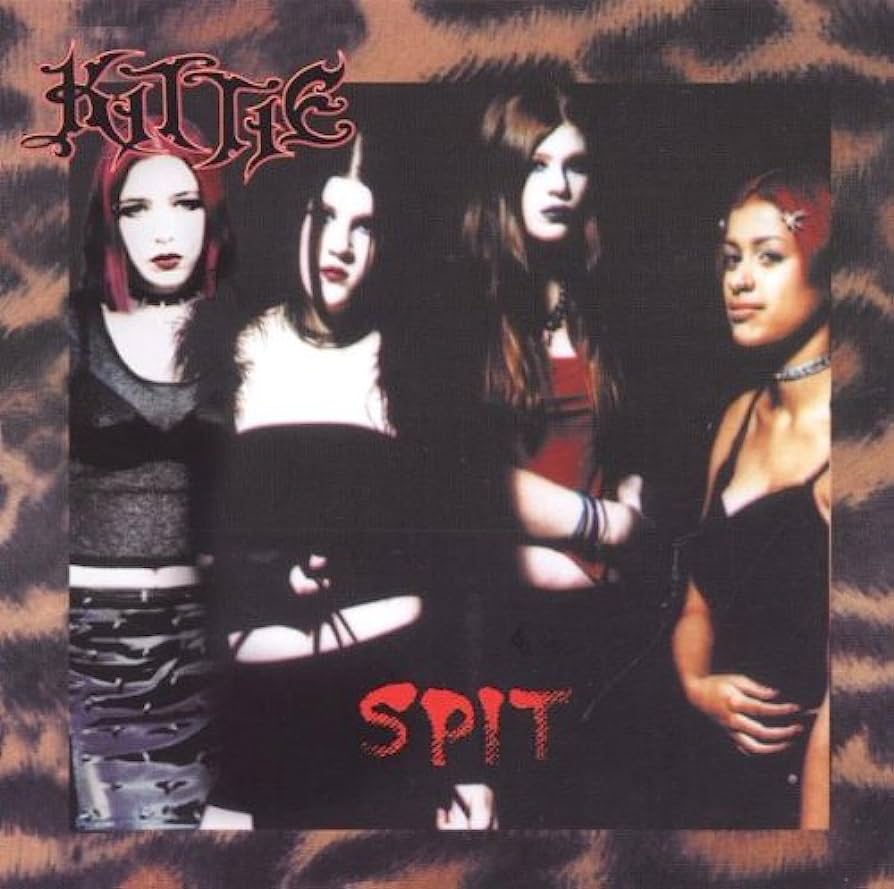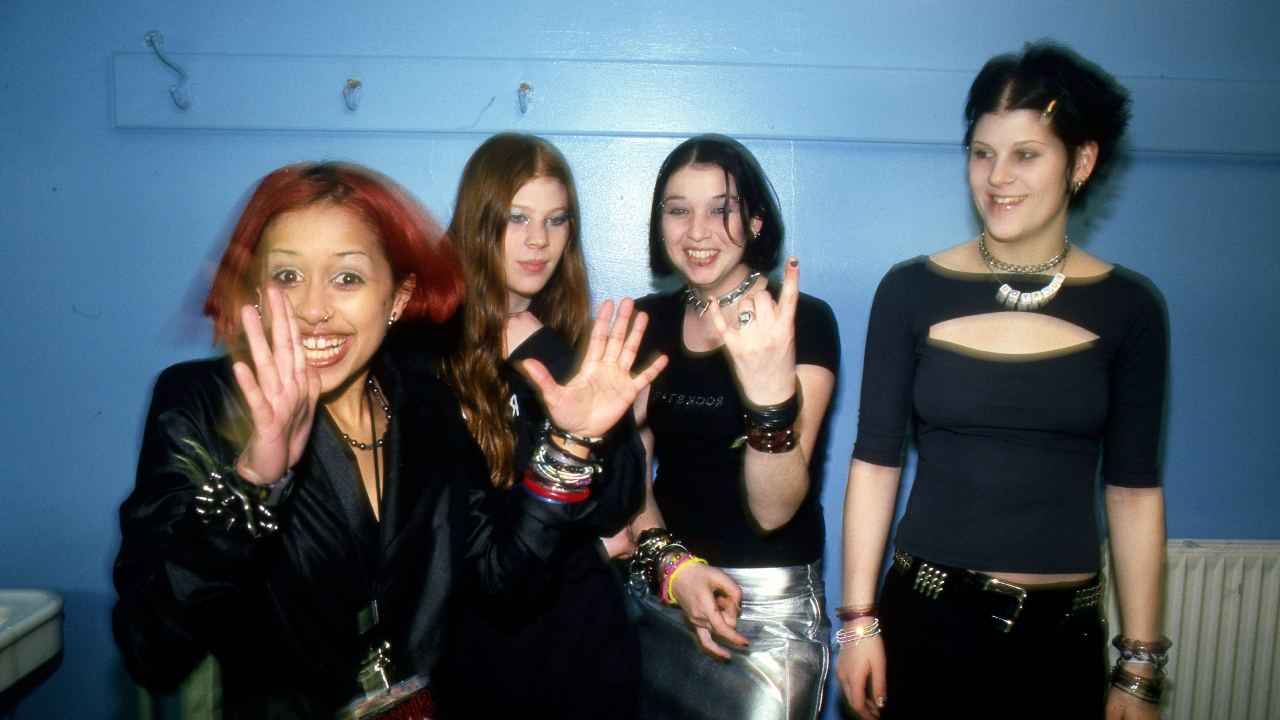Metal has long been a male- dominated space, but was arguably never as testosterone-driven as during the late 90s/early 00s nu metal goldrush. When Kittie released their debut album, Spit, in January 2000, it cut through the baggy pants bravado like a knife. Not only did it go harder and more aggressive than any nu metal album doing the rounds, with shades of death metal cutting through mountainous Korn-esque grooves, it also had thought-provoking and defiant songs like Choke and Suck, and sought to subvert gender expectations. And with Brackish, the band hit upon nu metal’s only genuine anthem of empowerment.
Yet, when the four then-teenagers headed into EMAC Studios in Ontario to record Spit in the summer of 1999, they had no expectations. After playing a showcase at Canadian Music Week a few months earlier, Kittie had been signed by NG Records, a small, independent punk label kicking up dust out of NYC, on a four-album deal. But even then, the band cheerfully admit the magnitude of the situation was lost on them. “I remember signing the deal, but it wasn’t like the golden magical pen like, ‘Hey, you guys got your big record deal’,” says vocalist Morgan Lander. “It felt very low key. We were so young, we were just here for the ride. We thought this would be a fun summer project. We were going to press 5,000 copies of Spit and that was going to be it.”
Given the band were still in high school, the Spit recording sessions, with Rage Against The Machine producer Garth Richardson, took place over nine days with the band doing their homework between takes. One song that would emerge from the sessions as particularly special was Brackish, which, with its jittery opening, brash, skittering electronic undercurrent and huge chorus, sounded worlds apart from anything else in the scene at the time. It would eventually become Spit’s first single and launch the band’s career, but it almost never saw the light of day.
“I’d call that song an afterthought,” says Morgan’s sister and the band’s drummer, Mercedes. “We weren’t even going to record it for Spit at all.”
“There is no video or audio recordings pre-recording of Spit that have Brackish in them in its current incarnation,” adds Morgan. “The song we played before that was in a different key and the song structure was the same, but it was very basic. There was no melody, there was just a talking part during the verse and then the chorus there was nothing but was a scream before the [main riff]. We recorded it but then we weren’t sure if we were going to put it on the album or leave it as an instrumental.”
Frustrated that the song was still plateauing, the band asked their sound engineer to bring in a friend who could DJ to take things to the next level. “We paid him a case of beer to play us some cool jungle,” laughs Mercedes. “The beats elevated [the song] to a place where the music stood out, but there still wasn’t a vocal melody that matched that elevation.”
Brackish’s now-iconic chorus wouldn’t come together until a few weeks later, when Morgan returned to the studio to lay down additional vocals. “I remember sitting on the floor in the vocal booth writing the lyrics down, it was right at the very tail-end, like, ‘I have no idea what I’m going to say here. I’ll just think of something.’ The chorus then the screaming part underneath that, I wrote on the floor. We spent one day, and I banged it out.”
Spit was originally released in November 1999 but was quickly pulled from the shelves and reissued when NG was bought out by Artemis Records at the end of the year. Around the same time, original bassist Tanya Candler left the band and was replaced by Talena Atfield, completing what many still believe is the ‘classic’ Kittie line-up along with lead guitarist Fallon Bowman. Together, the band filmed the video for Brackish during New York’s CMJ music festival at a gig supporting Biohazard. “[Renowned music video director] Floria Sigismondi wrote this incredible treatment with car crashes,” remembers Morgan. “But the label didn’t want to pay the price it would have cost, so we ended up doing a live video.”
“We were being heavily played on K-Rock [Radio] and had started to build a following,” adds Mercedes. “At that point, we actually had Kittie fans turning up to our shows, but the crowd was [mostly] industry people, which is hilarious because there’s definitely some push mosh going on.”
With Brackish on constant rotation on music video channels, things escalated quickly and in January 2000, Kittie were booked to support Slipknot on the Iowans’ first headline tour. “We left for the tour, and I just never went back to high school,” says Morgan. “Those first 5,000 copies that we thought we were only going to seek for the entirety of our career flew off the shelves in a couple of days when Spit was released and then it started to sink in, the true size of what was to come.”
That July, just a year after being signed, Kittie played the second stage at Ozzfest. Opening for headliners Soulfly, they were the youngest and only female band on the bill.
But rapid success also had a downside, and from the outset, the band found themselves exposed to the rampant misogyny of the 00s metal scene, and locked in a constant battle to be taken seriously. Reviews of Spit at the time of its release unanimously refer in astonishment to the fact the band were women. On a prominent US chat show a suggestion that they were “Britney Spears meets Slayer” was greeted by stony expressions and palpable annoyance. Meanwhile, during gigs, men would peek behind their amps, so certain they would find a bloke back there actually playing the guitars.
“Being a young person and having that around you really hurts. It sucks,” says Morgan. “There were suggestions made [by our label], ‘Maybe you can hire a songwriter to help you’ and we were like, ‘Fuck that.’ We were so defiant looking back, maybe it was detrimental with our relationship with the label. We said no to many things – I’m pretty sure Calvin Klein asked us to do [an advert] and we were like, ‘Fuck you, no way.’ That would have been huge! We were so much in control of our career and direction, we didn’t want anyone to question the validity of our songwriting skills or our abilities as musicians. No one could tell us what to do. We wanted to blaze our own trail and that is baked into Brackish and also the whole album.”
Saying that, in early interviews Kittie’s messages were mixed, engaging in gender politics while at the same time denying they were feminists. Rereading the lyrics to Brackish, it’s easy to forget just how young its creators were when they were written (Morgan was 17 and Mercedes was just 15). Penned about a friend in a toxic relationship with a “gross” older man (‘You know he can’t guide you / He’s your fuckin’ shoulder to lean on / Be strong’), the song clearly comes from a place of youthful angst and heightened emotion, yet there’s an underlying theme of independence and knowing your self-worth that still resonates 21 years later.
“I don’t think we thought far about that narrative and the wider meaning and how empowering the song actually is,” considers Mercedes. “I think a lot of our insecurities around feminism back in the early days of our career had a lot more to do with not understanding fully what being a feminist means,” adds Morgan. “We were afraid of the negative connotation that can often come with it, from people who also don’t understand what it means. We have always represented equality - even our existence challenged equality in the music industry. We fought for equal treatment, equal airtime and equal pay as women. We represented those things then, and still do now, even though we didn’t realise that’s what it meant to be a feminist.”
On their second album, 2001’s Oracle, Kittie veered away from nu metal, choosing instead to explore their more extreme influences, although they never again did reach the heady heights of their debut. And although the band’s 2018 Origins/Evolutions 20th anniversary documentary brought Kittie back into the conversation, Spit is still something of a lost nu metal gem that deserves more props than it gets. Yet the album’s true legacy is its message, which burns just as bright now as it did back then.
“To this day, people come to us and say, ‘Your music is so empowering, I’ve never heard a woman scream like this’,” agrees Morgan. “To me, that’s the biggest testimony to the music – it’s almost timeless. There’s something magical about Spit in general. It has this raw power that transcends the box nu metal was in. It radiates out. You can feel our youth, our anger, all these emotions that made Kittie who we were back then.”
Originally published in Metal Hammer #352


